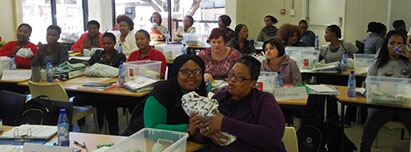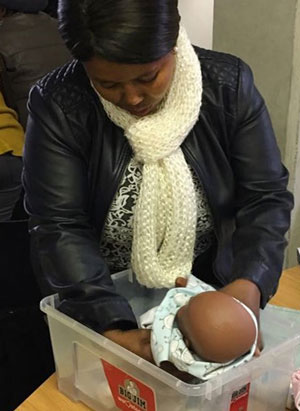
Prof Welma Lubbe, coordinator and leader of the Starfish project, recently received an award for the best research presentation at the Building Children Conference in Cape Town.
The project also sparked interest among healthcare professionals in the Western Cape and Limpopo provinces.
![]() SCROLL
SCROLL
Making a difference, one
'starfish'
at a time
The neonatal and under-five child death rate declined by 39% and 47% respectively, between the year 2000 and 2016 (UN, 2018:4).
However, the death rates are higher in Sub-Saharan Africa and South Asia compared to developed countries.
In these areas the mortality rate for children under five was 86:1 000 in 2015, while the neonatal mortality rate was 28:1 000 in 2016 (UN, 2017:5; UN, 2018:4).
This quote aptly describes all the NWU staff members who are involved in the School of Nursing’s Starfish project.
The project is named after the legend about a young boy who was standing on a beach covered in starfish, throwing some of them back into the water. Told that saving a few would make no difference, he picked up one starfish and said: “To this one, it will make a difference.”
This four-year project kicked off in January 2018, with the main aim of improving neonatal, infant and childcare for under-fives. The project, a collaboration between the NWU and the Provincial Department of Health, started with 50 participants.
Empower health care professionals
The project also aims to empower health care professionals and health care workers by improving staff confidence in the various settings, such as clinics and hospitals.
Another aim is to establish centres of excellence for various neonatal and childcare functions in the North West province.
Health care workers receive the latest evidence on foetal development, assessment of the neonate (baby) after birth, childhood illnesses, nutrition, emergency child care and normal development. They are also taught how to take care of the mother after birth.
Prevent deaths among children
“Some of the main causes of infant mortality and morbidity are factors such as malnutrition and poor hygiene. These can easily be prevented if people are equipped with the necessary knowledge,” says Prof Welma Lubbe, project leader.
“It is impossible for us to travel all over the province to educate the mothers. Therefore, with this project, we empower the health care professionals and workers so that they can further educate others.”
Challenges and successes
No project comes without its challenges. “We have challenges such as transport issues and staff shortages, as well as a lack of suitable training venues, but we are working towards overcoming them,” Welma says.
The project has been deemed very successful. Clinics that took part in the Starfish project in 2018 have reported that it has made a huge difference and created a more positive and efficient work environment.
“The staff members we trained went back and came up with different initiatives to increase client services,” says Welma.
“They created posters, and gave people proper information on issues such as hygiene and nutrition during their home visits.”
Grandparents also participate
A grandmother support group was formed, teaching grandmothers how to take care of newborns. This led to the grandfathers feeling left out, and so a group for grandfathers was also established.
Myths on how to care for new-borns are dispelled and the grandparents also receive correct information on how to handle medical emergencies.
“I would like to thank everyone who has been involved in making this project a success,” says Welma.
The Starfish project proves that we might not be able to change the entire world, but we can at least change a small part of it.
Knowledge can save lives, even if it is one infant at a time. For those children it makes a world of difference.

Health care professionals attend one of the workshops presented as part of the Starfish project.

One of the aims of the Starfish project is to equip people with the knowledge and skills to work with babies and young children.
![]() SCROLL
SCROLL

“A single, ordinary person can still make a difference – and single, ordinary people are doing precisely that every day.”